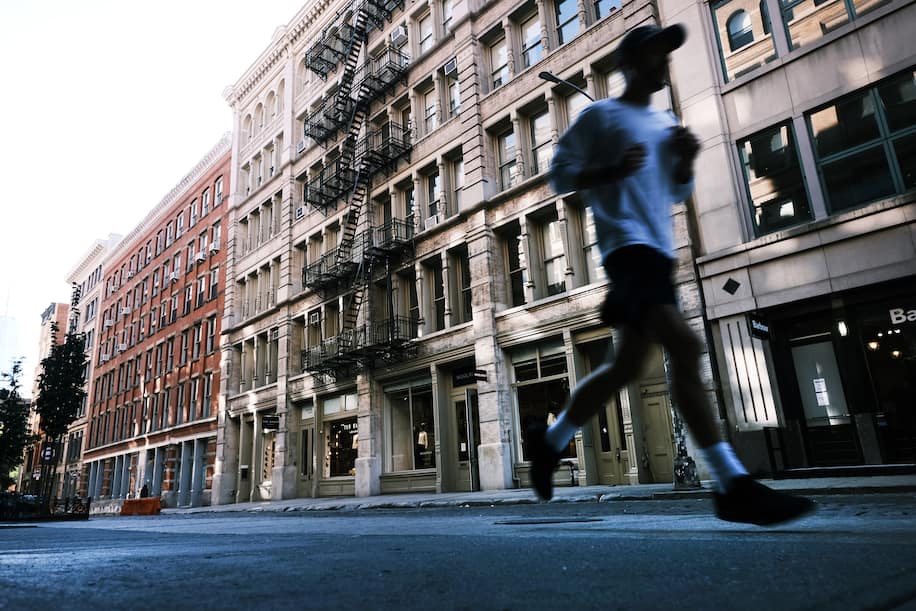The Daily Ten – Flipping Robots, Rich cities grip on the economy, China’s economic surge, Roosevelt Island frenzy….

The Daily Ten
1. Not even a pandemic can break rich cities’ grip on the U.S. economy | Washington Post
The allure of expensive ‘superstar cities’ such as New York, San Francisco and D.C. will remain strong, even as technology opens pathways to work pretty much anywhere
Each period branded the city with deep economic pain, triggering massive job losses and the evisceration of small businesses. He remembers headlines blaring, “New York is over.” But, he said, “every single time, we bounce back.”
Now 49 and the chief operating officer of a health and fitness app, Noom, Fawer is trying to steer his company through the shocks of the novel coronavirus and ensuing recession. Operations shifted online and staff went remote in March. Business fell about 10 percent initially, he said, but swiftly picked up. He’s now adding staff and expects the corporate head count will soon be double what it was in January.
While it showed the company could function, even thrive, without a physical office, Fawer said, “we’ve also learned we don’t enjoy it that much. It’s the difference of being at a party, and being on FaceTime and people are passing you around.”
2. Pressure on New York City Commercial Real Estate Worries Investors | WSJ
Collapsing loan prices in Manhattan developments could be a sign of trouble ahead for commercial mortgage-backed securities
Signs of pressure on New York City’s commercial properties are fueling investor bets that trouble in the nation’s largest real-estate market could spread pain nationwide.
Although stock markets are near records, assets whose fortunes are more directly tied to New York’s status as a heart of tourism and culture are showing acute sensitivity to the pandemic’s disruptions. Prices for debt backed by hotels and shops have fallen, new loans have slowed and lenders are more cautious, leaving bankers and the real-estate industry bracing…
3. With Covid-19 Under Control, China’s Economy Surges Ahead | The New York Times
Exports jumped and local governments engaged in a binge of debt-fueled construction projects. Even consumer spending is finally recovering.
BEIJING — As most of the world still struggles with the coronavirus pandemic, China is showing once again that a fast economic rebound is possible when the virus is brought firmly under control.
The Chinese economy surged 4.9 percent in the July-to-September quarter compared with the same months last year, the country’s National Bureau of Statistics announced on Monday. The robust performance brings China almost back up to the roughly 6 percent pace of growth that it was reporting before the pandemic.
4. Despite Pandemic, Hotel Chains Grow in Africa | WSJ
Global chains snap up distressed independent properties in bid to expand footprints
JOHANNESBURG—Africa’s tourism sector has cratered in the face of the coronavirus, but the world’s biggest hotel chains remain committed to the continent.
Major hotel chains, from Marriott International to Radisson Hotel Group and Paris-based Accor, Europe’s largest hotel company, say their African businesses are not only holding up, they are determined to stay on track with, if not grow, their footprints. The companies see sub-Saharan Africa as underserved and underdeveloped in terms of hotels and predict that demand for both…
5. Remote but Inclusive for Years, and Now Showing Other Companies How | The New York Times
Ultranauts has been developing creative ways to hire, manage and motivate a far-flung and diverse work force for seven years.
From her home in Beaverton, Ore., Jamie Davila leads a team of eight engineers in seven states for the technology start-up Ultranauts. Like millions of other people during these work-from-home times, she relies on popular communication tools like Zoom and Slack.
But Ms. Davila and Ultranauts also work remotely in ways that make them different from most companies. They follow a distinctive set of policies and practices to promote diversity and inclusion among employees.
6. Developers eyeing coveted Roosevelt Hotel site | New York Post
Last week’s news that the historic Roosevelt Hotel was closing had New Yorkers teary-eyed and developers drooling.
The historic, nearly 100-year-old Roosevelt announced on Oct. 12 that it would be checking out for good at the end of the month because it could no longer survive the pandemic. Longtime owner Pakistan International Airlines said it has “currently no plans for the building” after that. But that hasn’t stopped tongues from wagging over the real estate at 45 E. 45th St., which takes up the whole block between Madison and Vanderbilt avenues and between East 45th and 46th streets.
Surely, it will be missed as the setting for Guy Lombardo’s New Year’s Eve ballroom performances and for its atmospheric public spaces. But it’s the property’s potential that is tantalizing developers, who’ve been circling it for years as the roughly 43,000-square-foot site can support a new building much larger than the current 18-story one.
7. Bringing the outside into the office: Coronavirus bolsters push towards healthier building design | CNBC
Even as the coronavirus pandemic worsens in the U.S., stay-at-home orders in some areas have loosened and companies have sent some workers back to offices with social distancing restrictions, temperature checks and plexiglass sneeze barriers.
These new health precautions amid Covid-19 are new for offices. But architects and office designers have long worked on innovations to make corporate space healthier and better for the environment — projects they say will be in higher demand even as millions work from home and corporations rethink their need for future office space.
“When you go back, when I go back, people will look at office buildings differently,” said Joseph Allen, director of the Healthy Buildings Program at the Harvard T.H. Chan School of Public Health.
8. Spread of electric cars sparks fights for control over charging | Fox Business
Utilities seek approval to upgrade infrastructure
Electric vehicles are widely seen as the automobile industry’s future, but a battle is unfolding in states across America over who should control the charging stations that could gradually replace fuel pumps.
From Exelon Corp. to Southern California Edison, utilities have sought regulatory approval to invest millions of dollars in upgrading their infrastructure to prepare for charging and, in some cases, to own and operate chargers.
The proposals are sparking concerns from consumer advocates about higher electric rates and oil companies about subsidizing rivals. They are also drawing opposition from startups that say the successors to gas stations should be open to private-sector competition, not controlled by monopoly utilities.
9. Tired of the same old home office? Punch the clock in a hotel guest room | Washington Post
Before the coronavirus pandemic, leisure travelers typically reserved daytime stays if they had long layovers or evening flights. The hotels were often near an international airport, so guests could rest and shower before hopping on a shuttle and jetting off to their next destination.
Business travelers also occupied hotels during the working hours, using the properties’ conference rooms or executive suites as satellite offices. During the global crisis, however, a new type of traveler has emerged: the accidental digital nomad. To accommodate the needs of remote workers, hotels are flipping their reservation times and touting their office amenities over their R&R perks, many of which are closed or limited anyhow.
“Most hotels will be open to something like this,” said John S. Fareed, managing director of North America at Horwath HTL, a consulting firm that specializes in hospitality, tourism and leisure. “Some are really going for it and promoting it. Others are going with the flow. But right now, I think this should be a priority.”
10. Flippy, the $30,000 automated robot fast-food cook, is now for sale with ‘demand through the roof’ — see how it grills burgers and fries onion rings | Business Insider
Robots can flip burgers and fry sides, and Miso Robotics is selling its burger-flipping robot as the perfect fry cook for the COVID-19 era.
Robot assistant Flippy just became commercially available for $30,000, or on a payment plan, with plans to eventually lower the price. Flippy is attached to a rail under the kitchen hood to move back and forth while manning the grill and fryer.
“After we shared a sneak peek of the prototype in January, we’ve seen demand through the roof from operators, especially in light of COVID-19” Miso Robotics CEO Mike Bell said in a press release. The coronavirus pandemic has hit restaurants hard, but fast-food chains have recovered faster with the drive-thru and takeout business not relying on indoor dining, compared to fast-casual chains.

